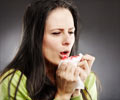Cough medicines did not show benefits for the treatment of cold and flu. It only made the individual drowsy that led only to a good night’s sleep.
Highlights
- Cold is one of the common illness that is characterized by sneezing, runny nose, cough and sore throat.
- A recent research study from the American Chemical Society found cough medicines to be useless in common cold treatment.
- Medicines did not show a cure for cough and were able to produce drowsiness that led only to a good night’s sleep.
Cough drops were effective in soothing the throat. There was only a little evidence that cough syrup was effective in treating coughs and they were no better than placebo drug.
The cough medicines marketed in Britain was found to be £400 million per year. Most of the cough and congestion relief medicines were found to contain active ingredients like dextromethorphan. These medicines block the cough reflex and can make you feel drowsy.
Expectorants like guaifenesin were found to loosen the mucus in the chest. According to the Cochrane review 2014, there was no good evidence on the benefits and disadvantage of using cough syrups.
John Smith, chief executive of the Proprietary Association of Great Britain, said, there was difficulty in testing the ingredients efficacy for different types of cough.
He also added that ‘It’s important to remember that cough medicines will not “cure” a cough.
Common Cold
Cold is the most common illness which is characterized by runny nose, sneezing, coughing and sore throat. They are mainly caused due to rhinoviruses.
- Nasal decongestants- to unclog the stuffy nose (nasal blockage)
- Antihistamines - for a runny nose and sneezing
- Cough suppressants - to suppress cough
- Expectorants - loosen mucus
- Washing your hands regularly with soap may help to protect you from getting cold.
- Do not touch your face, eyes or mouth with unwashed hands that contain cold virus.
- Stay away and avoid close contact with people who are sick to protect yourself from cold.
- Cold and Cough Medicines - (https://medlineplus.gov/coldandcoughmedicines.html)
- Common Colds: Protect Yourself and Others - (https://www.cdc.gov/features/rhinoviruses/)
Source-Medindia















